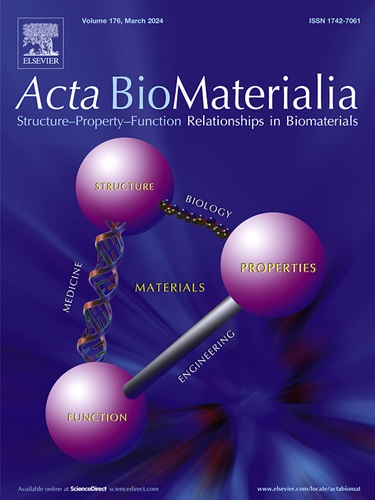生物活性玻璃诱导的B细胞耗竭重塑骨免疫微环境促进成骨。
IF 9.4
1区 医学
Q1 ENGINEERING, BIOMEDICAL
引用次数: 0
摘要
B细胞在骨稳态中起着至关重要的作用,其功能障碍与各种骨疾病有关。生物活性玻璃(BGs)以其免疫调节特性而闻名,并越来越多地用于骨再生。然而,BGs对B细胞的具体作用及其随后对成骨的影响尚不清楚。在本研究中,我们研究了三种BGs (45S5-BG、13-93-BG和B3-Cu-Zn-BG)对B细胞的免疫调节作用。13-93-BG对活化的B细胞存活影响很小,而45S5-BG对B细胞有明显的细胞毒作用。值得注意的是,B3-Cu-Zn-BG对致病性B细胞表现出最高的细胞毒性,值得进一步研究其机制。B3-Cu-Zn-BG的离子溶解产物(IDPs)通过上调线粒体凋亡途径和NADPH氧化酶相关基因的表达,对B细胞产生浓度依赖性和时间依赖性的细胞毒性。b3 - cu - zn - bg衍生的IDPs提高了B细胞中活性氧的产生,从而以浓度依赖的方式诱导细胞凋亡。此外,当与骨髓干细胞(BMSCs)共培养时,b3 -cu - zn - bg衍生的IDPs可以促进BMSCs的成骨细胞分化,同时选择性靶向和消除B细胞。为了证实b3 - cu - zn - bg来源的IDPs在体内的骨免疫调节作用,我们采用了人肿瘤坏死因子转基因(TNF-tg)小鼠类风湿关节炎模型。在TNF-tg关节炎小鼠关节内注射IDPs通过减少B细胞聚集和促进成骨细胞分化来减轻骨侵蚀。本研究表明,b_3 - cu - zn - bg不仅能诱导B细胞凋亡,还能促进成骨,突出了其作为炎症性骨病治疗策略的潜力。重要性声明:尽管生物活性玻璃(BGs)用于组织再生已有数十年,但其免疫调节作用尚未得到全面评估。B细胞在许多炎症性骨病的发病机制中起着至关重要的作用。本研究通过研究B3-Cu-Zn-BG的免疫调节特性,揭示了其选择性诱导B细胞凋亡,促进骨髓干细胞成骨分化的能力。值得注意的是,在类风湿性关节炎小鼠模型中,B3-Cu-Zn-BG显著减少骨侵蚀和促进成骨。BGs在通过局部调节B细胞调节骨免疫微环境方面具有很大的潜力。这些发现强调了BGs作为炎症性骨病的新治疗方法的潜力,为骨再生和免疫调节提供了新的见解。本文章由计算机程序翻译,如有差异,请以英文原文为准。

Bioactive glass-induced B cell depletion remodels the osteoimmunological microenvironment to enhance osteogenesis
B cells are critical in bone homeostasis, and their dysfunction is linked to various bone disorders. Bioactive glasses (BGs) are known for their immunomodulatory properties and are increasingly utilized in bone regeneration. However, the specific effects of BGs on B cells and their subsequent impact on osteogenesis remain unclear. In this study, we investigated the immunomodulatory effects of three BGs (45S5-BG, 13-93-BG, and B3-Cu-Zn-BG) on B cells. 13-93-BG had minimal effect on the survival of activated B cells, while 45S5-BG induced a noticeable cytotoxic effect on B cells. Notably, B3-Cu-Zn-BG exhibited the highest cytotoxicity towards pathogenic B cells, prompting further investigation into its mechanisms. The ionic dissolution products (IDPs) of B3-Cu-Zn-BG exerted concentration- and time-dependent cytotoxicity on B cells by upregulating the expression of genes associated with the mitochondrial apoptosis pathway and NADPH oxidases. B3-Cu-Zn-BG-derived IDPs elevated reactive oxygen species production in B cells, which induced apoptosis in a concentration-dependent manner. Additionally, when co-cultured with bone marrow stem cells (BMSCs), B3-Cu-Zn-BG-derived IDPs promoted osteoblastic differentiation of BMSCs while selectively targeting and eliminating B cells. To confirm the in vivo osteoimmunomodulatory effects of B3-Cu-Zn-BG-derived IDPs, we employed a human tumor necrosis factor transgenic (TNF-tg) mouse model of rheumatoid arthritis. Intra-articular injection of the IDPs in TNF-tg arthritic mice attenuated bone erosion by reducing B cell aggregates and improving osteoblastic differentiation. This study indicates that B3-Cu-Zn-BG not only induces B cell apoptosis but also promotes osteogenesis, highlighting its potential as a therapeutic strategy for inflammatory bone diseases.
Statement of significance
Despite decades of use in tissue regeneration, bioactive glasses (BGs) have not been thoroughly evaluated for their immunomodulatory effects. B cells play a crucial role in the pathogenesis of numerous inflammatory bone diseases. By investigating the immunomodulatory properties of B3-Cu-Zn-BG, this research reveals its ability to selectively induce B cell apoptosis and promote osteoblastic differentiation of bone marrow stem cells. Notably, in a rheumatoid arthritis mouse model, B3-Cu-Zn-BG significantly reduced bone erosion and enhanced osteogenesis. BGs of specific compositions have thus great potential in regulating the osteoimmunology microenvironment by locally modulating B cells. These findings underscore the potential of BGs as a novel therapeutic approach for inflammatory bone diseases, offering insights into bone regeneration and immunomodulation.
求助全文
通过发布文献求助,成功后即可免费获取论文全文。
去求助
来源期刊

Acta Biomaterialia
工程技术-材料科学:生物材料
CiteScore
16.80
自引率
3.10%
发文量
776
审稿时长
30 days
期刊介绍:
Acta Biomaterialia is a monthly peer-reviewed scientific journal published by Elsevier. The journal was established in January 2005. The editor-in-chief is W.R. Wagner (University of Pittsburgh). The journal covers research in biomaterials science, including the interrelationship of biomaterial structure and function from macroscale to nanoscale. Topical coverage includes biomedical and biocompatible materials.
 求助内容:
求助内容: 应助结果提醒方式:
应助结果提醒方式:


